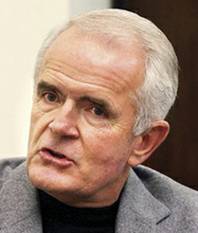Sunday, Jan. 10, 2010 | 2 a.m.

Gov. Jim Gibbons
Sun Coverage
Budgets are usually handled by the executive and legislative branches. But the now-inevitable special session to deal with the state shortfall might require the involvement of the third branch of government.
The tension between the governor and Democrat-controlled Legislature makes this looming session particularly unpredictable. If Republican Gov. Jim Gibbons and the Legislature can’t come up with a compromise, the Nevada Supreme Court might have to step in and settle things.
Under the Nevada Constitution, the governor can call the state’s part-time lawmakers back to Carson City when they’re not in their once-every-two-years regular session. The governor shall state “the purpose for which they have been convened, and the Legislature shall transact no legislative business, except that for which they were specially convened.”
What exactly that means has never been tested. Does the governor identify a problem, such as the budget deficit, and the Legislature then figures out how it wants to deal with it? Or does the executive branch have a stronger role to play and tighter control over the agenda — preventing them from considering higher taxes, for example?
The court has never been asked to rule on the question. Special sessions have typically been cooperative affairs. The governor meets with legislative leadership, they come to an agreement on some bills, and the lawmaking and lobbying set are in and out quickly.
But we’re now wading into uncharted political waters.
“There has been a long-running, if subdued, dispute between the executive and legislative branches over exactly how far the governor’s power extends to control the agenda of a special session,” wrote Josh Hicks, Gibbons’ former chief of staff, on his “Of Note Nevada” blog. “The issue has the potential to come to a head if the governor and Legislature cannot agree in advance how to best resolve the growing budget deficit in Nevada.”
In an interview, Hicks laid out some scenarios.
“The governor could say, ‘Here’s the budget problem, here’s how to fix it. I’m calling you into session so you can vote on it.’ ” Hicks said. “The Legislature could say, ‘You have identified a problem that needs to be fixed, but you can’t tell us how to fix it.’
“Or they could always take no action. Then you’ve got a real standoff at that point.”
Robin Reedy, Gibbons’ chief of staff, insisted that the governor will reach out to Democratic leaders to come up with a compromise solution to the budget and education reform.
But the two sides don’t have a history of playing well together.
So far, the Legislature has refused to let the governor draft any bills for a special session.
And in a meeting with legislators last week, where he presented an aggressive series of proposed education reforms, Gibbons told lawmakers that, if he has to, he’ll have his general counsel draft proposed language and call “as many special sessions as necessary” to get the reforms passed.
Not a promising opening for any cooperative effort.
Both sides do seem to agree that the agenda for a special session should include:
• Changes in Nevada law that prevent test scores from being used in teacher evaluations. The change would allow the state to apply for federal grant money.
• Action to address the budget shortfall as tax revenue has fallen $72 million below projections since the state passed a budget in June. (The Economic Forum, made up of five business leaders, will announce a new forecast Jan. 22. Early estimates are that the state will have $300 million to $500 million less than previously forecast for the period ending in June 2011. That could lead to budget cuts exceeding 10 percent.)
Thrown into the mix by Gibbons last week were some dramatic education reform proposals. The governor said he aims to save $30 million to $100 million in K-12 spending. But his proposals include taking on Democratic sacred cows such as collective bargaining and the teachers union, and launching a statewide school voucher plan.
The best-case scenario is legislators and the governor reach an agreement before a special session and things go smoothly. If not, there’s always the Supreme Court.

Join the Discussion:
Check this out for a full explanation of our conversion to the LiveFyre commenting system and instructions on how to sign up for an account.
Full comments policy